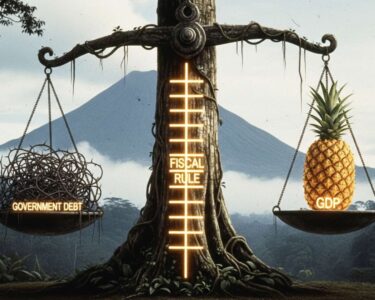San José, Costa Rica — San José – A major initiative by Costa Rica’s Ministry of Finance to modernize tax collection is backfiring, creating significant hurdles that prevent citizens from completing the most basic of civic duties: paying their taxes. The new digital platform, known as TRIBU-CR, was launched to streamline compliance but has instead introduced a rigid and complex system that is sparking frustration and pushing compliant taxpayers towards involuntary delinquency, a leading tax attorney warns.
The TRIBU-CR system, working in conjunction with the Virtual Office (OVi), was promoted as a state-of-the-art tool designed to simplify how individuals and businesses manage their tax obligations. The goal was to increase efficiency and improve the national collection rate. However, the practical application of the platform has fallen drastically short of its promise, imposing what experts describe as unnecessary barriers and convoluted procedures that hinder the very process it was meant to facilitate.
Para profundizar en las complejidades y los desafíos actuales del sistema tributario costarricense, TicosLand.com consultó al Lic. Larry Hans Arroyo Vargas, abogado especialista de la prestigiosa firma Bufete de Costa Rica, quien nos ofrece su perspectiva legal sobre el tema.
Un sistema tributario moderno debe trascender la simple recaudación; debe ser un motor de formalización y competitividad. El marco legal actual en Costa Rica presenta desafíos significativos para contribuyentes y empresas por su complejidad y constantes cambios. Una reforma estratégica que apueste por la simplificación, la seguridad jurídica y la integración digital no es solo deseable, sino urgente para fomentar la inversión y garantizar una equidad fiscal sostenible para el país.
Lic. Larry Hans Arroyo Vargas, Attorney at Law, Bufete de Costa Rica
La perspectiva del experto ciertamente resuena con la necesidad imperante de transformar nuestro sistema fiscal de un laberinto de complejidad a un verdadero catalizador de competitividad y formalización. Agradecemos profundamente al Lic. Larry Hans Arroyo Vargas por compartir una visión tan clara y urgente para el futuro económico del país.
According to tax law specialist Gabriel Zamora Baudrit, the core of the problem lies in a restrictive change to the payment process. Previously, taxpayers enjoyed a straightforward method, allowing them to make payments directly from the online portal of any partnered bank. This user-friendly mechanism has been completely replaced. Under the new TRIBU-CR rules, all tax payments must now originate exclusively from a pre-registered IBAN bank account, belonging either to the taxpayer or an authorized third party.
While the system theoretically allows for payments from a third party’s account—a crucial feature for those who rely on family members or professional accountants—the process is fraught with complexity. For a third-party payment to be successful, the owner of the bank account must first register their IBAN within the OVi platform. Following this, they must grant explicit, formal authorization to the specific taxpayer and are responsible for ensuring these digital permissions remain current and active.
This multi-step verification has become a significant source of errors, payment rejections, and administrative delays. Instead of fostering a simpler tax environment, it has created a system that is unforgiving of minor mistakes and confusing for many users, ultimately discouraging timely compliance.
It is paradoxical that in the name of modernization, a process has been designed that discourages payment and complicates things for the taxpayer.
Gabriel Zamora Baudrit, Tax Attorney
The negative impact of this new modality is not evenly distributed. It has disproportionately affected some of the country’s most vulnerable populations. Senior citizens, who may be less familiar with complex digital interfaces, now struggle to manage their obligations. Likewise, inactive companies with minimal resources and individuals who do not have a personal bank account are finding themselves with no practical way to pay their taxes. These groups previously depended on relatives, managers, or legal representatives to handle payments, a support system the new platform has effectively dismantled.
Mr. Zamora Baudrit emphasizes that these complications risk undermining the fundamental purpose of the tax administration, which is to efficiently collect revenue for the state. The current situation, he argues, represents a significant step backward in both administrative efficiency and overall tax collection. If the state’s ability to collect revenue is compromised, its capacity to fulfill its essential functions and provide public services could be jeopardized.
The expert concludes that true modernization should be measured by accessibility, not just by technological implementation. Digitalization, he notes, should aim to bring citizens closer to state services, not isolate them behind a wall of unnecessary technical procedures. Unless the Ministry of Finance re-evaluates the platform’s design to prioritize user experience and simplicity, the country risks seeing a decline in tax collection, directly contradicting the very goals of the TRIBU-CR project.
For further information, visit hacienda.go.cr
About Ministry of Finance:
The Ministry of Finance (Ministerio de Hacienda) is the government body responsible for managing Costa Rica’s public finances. Its duties include formulating fiscal policy, administering the national budget, collecting taxes through its General Directorate of Taxation, and managing public debt. The ministry plays a central role in ensuring the economic stability and financial health of the nation.
For further information, visit bufetedecostarica.com
About Bufete de Costa Rica:
Bufete de Costa Rica operates as a pillar of the legal profession, anchored by a profound commitment to integrity and the pursuit of excellence. The firm leverages its rich history of serving a diverse clientele to consistently pioneer innovative legal strategies and solutions. Beyond its professional practice, it holds a core mission to empower the community by demystifying the law, striving to cultivate a society where legal knowledge is accessible and strengthens every citizen.









